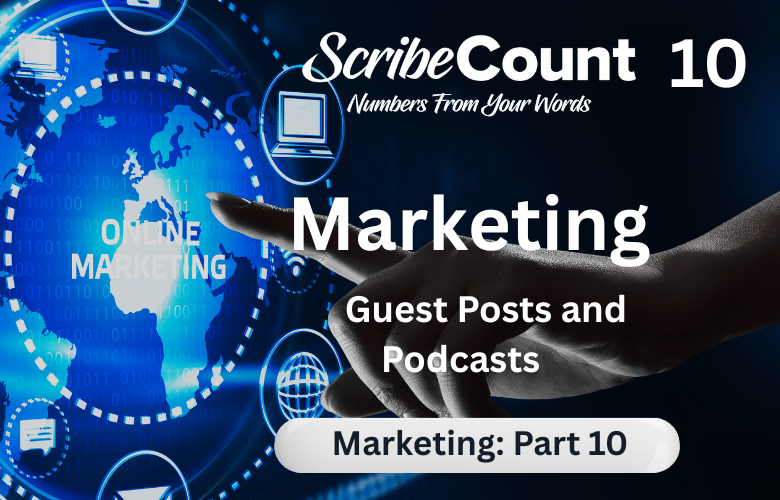Guest Posts and Podcasts for Indie Authors
For the modern indie author, visibility is everything. With hundreds of thousands of books published each year, simply uploading a title to Amazon or Kobo and hoping readers will discover it is no longer a viable strategy. Indie authors must step into the role of active marketer, building relationships, driving attention, and positioning themselves as trusted voices in their genre. Among the most effective and often underutilized tools for accomplishing this are guest posts and podcast appearances.
These two avenues—guest blogging and podcasting—allow authors to tap into existing audiences, share their voice, and offer genuine value to readers and writers alike. When approached strategically, they can boost credibility, grow email lists, introduce new readers to books or series, and even drive short-term spikes in sales.
But guest posts and podcasts aren’t just about promotion—they’re about connection. By sharing meaningful stories, behind-the-scenes insights, or practical writing advice, authors position themselves as generous professionals who contribute to their community. Whether you're just launching your first novel or managing an expansive backlist, the power of appearing on the right podcast or guest posting on the right blog cannot be overstated.
In this article, we’ll explore what guest posts and podcasts are, how authors use them effectively, the tools and platforms that support them, and the marketing strategies that make these appearances more than just fleeting mentions. We’ll also examine the pros and cons, best practices for engagement, how to use links and coupons to drive conversions, and how to integrate guest features into a comprehensive author marketing plan.
What Are Guest Posts and Podcast Appearances?
A guest post is a written article you provide for someone else’s blog, website, or newsletter. Usually, this post is designed to serve the host’s audience with value—writing advice, a reader-facing piece, or a behind-the-scenes look at your books. In return, the host allows you to include a short bio, often with links to your website, email list, or books.
A podcast appearance is similar, but instead of writing, you’re interviewed on a podcast—a digital audio show streamed via platforms like Spotify, Apple Podcasts, or YouTube. Podcasts may focus on author marketing, genre fiction, publishing strategies, or book discussions. A good podcast spot gives you anywhere from 15 to 60 minutes to speak directly to an engaged audience, often with links included in the show notes.
Both guest posts and podcast interviews function as borrowed trust. You’re appearing on someone else’s platform, gaining access to their followers. These audiences already trust the host, so when that host brings you on or features your content, some of that trust transfers to you.
The goal is not just to talk about your book, but to deliver something valuable—knowledge, inspiration, entertainment—that leads the audience to want to know more about you and what you’ve written.
How Indie Authors Use Guest Posts and Podcasts
Guest posts and podcast appearances serve multiple functions in an author’s marketing strategy. First, they expand reach. Rather than building an audience from scratch, these platforms allow authors to speak to established, targeted followings—whether writers, genre fans, or book buyers.
Second, they build credibility. When a respected podcast host brings you on or a well-known blog publishes your article, it signals that you’re a professional worth paying attention to. This is especially important for newer authors looking to build trust and recognition.
Third, they drive traffic. A well-placed article or podcast can lead hundreds (sometimes thousands) of readers to your website, newsletter opt-in, or book page. This effect is even more powerful when paired with a special offer, exclusive content, or limited-time coupon.
Finally, they compound. One guest feature often leads to others. A podcast listener may invite you onto their own show. A blog editor might request a follow-up piece. As you show up across platforms, your name becomes more familiar, which increases discoverability over time.
Reaching the Right Audience: Strategic Targeting
The key to using guest appearances effectively is targeting. Not all blogs or podcasts will serve your goals. A fantasy author appearing on a nonfiction business podcast may not gain many new readers. Instead, authors should focus on platforms whose audiences align with their genre, themes, or reader base.
For example, if you write cozy mysteries, appearing on a podcast that reviews cozy books, discusses traditional sleuth tropes, or interviews indie cozy authors makes far more sense than joining a generic writing show. Likewise, guest posting on blogs like The Cozy Mystery Book Club or newsletters like Booksweeps puts your content in front of readers already interested in what you write.
When researching podcasts, platforms like Podchaser or MatchMaker.fm can help find genre-specific shows accepting guests. For blogs, start with Medium, Reedsy’s blog, and author collectives in your genre, many of which welcome guest contributors.
Making the Most of Guest Posts
A successful guest post isn’t just about what you write—it’s about what you include. Your article should deliver genuine value to the host’s audience. This might mean sharing your personal writing journey, revealing how you researched historical details for your novel, or offering tips for managing creativity and burnout.
At the end of the article, you’ll typically include a short bio and links. This is where strategy matters. Rather than just linking to your Amazon author page, consider linking to:
-
Your newsletter opt-in with a free book or reader magnet
-
A series page on your website featuring all formats (ebook, audio, print)
-
A limited-time offer hosted on BookFunnel, Payhip, or Books2Read
For instance, a guest post about the inspiration behind your post-apocalyptic thriller might end with:
“Download the first book in the Half a World series free for a limited time: [link].”
This strategy encourages readers to act now and provides a direct path to conversion.
Leveraging Podcasts for Deep Engagement
Podcasts offer a different kind of value: intimacy. Listening to someone’s voice for 30–45 minutes builds a stronger emotional connection than reading a short blog. When listeners hear your tone, laugh at your stories, and resonate with your process, they’re far more likely to become fans.
The best podcast appearances are conversational, honest, and story-driven. Listeners want to hear about your struggles, breakthroughs, and behind-the-scenes insights. While it’s tempting to talk about your book, the focus should be on what the audience can relate to or learn from.
During the interview, be sure to mention:
-
Where listeners can learn more about you (your site or link)
-
What they can get for free (reader magnet or exclusive story)
-
Any time-limited offer or special deal you’re running
These should be worked into the flow of conversation rather than rattled off at the end. The more naturally you integrate your book and platform, the more effective your promotion will be.
Including Special Offers and Coupons
To maximize the impact of a guest appearance—whether written or recorded—authors should include special offers tied to the post or podcast. These can include:
-
A free book delivered via BookFunnel
-
A 25% off coupon for your direct store powered by Shopify or WooCommerce
-
A limited-time audiobook code through Authors Direct or Spotify Audiobooks
Mention the offer in the interview or article and include a simple, easy-to-remember link. For example:
“Visit randallwoodauthor.com/freemystery to claim your free download.”
or
“Use code PODCAST25 for 25% off signed paperbacks in my store.”
These offers create urgency and reward engaged listeners or readers with something valuable, increasing conversion and email sign-ups.
What to Talk or Write About
One of the biggest challenges authors face is knowing what to say during a podcast or guest post. The answer depends on the audience, but there are a few universally effective approaches:
-
Your personal journey to becoming a writer
-
The real-life inspiration behind a character or setting
-
Your favorite part of writing your current series
-
Advice to newer writers or aspiring authors
-
Life lessons learned through the creative process
-
Unique research you did to prepare for a book
-
Reader reactions, fan mail, or touching moments
For reader-facing content, lean into emotional storytelling and behind-the-scenes access. For writer-focused platforms, share what you’ve learned and how you overcame challenges. The goal is always to be useful, authentic, and memorable.
Pros and Cons of Podcasts and Guest Posts
Like any marketing tool, guest appearances come with benefits and drawbacks. On the positive side, they are often free, require only your time, and provide long-lasting value. A blog post can be found months or years later via Google. A podcast can continue attracting listeners indefinitely through search, recommendation algorithms, or republishing on new platforms.
They also build trust. Hearing your voice or reading your story makes you more human—and in an increasingly automated, noisy marketplace, that kind of connection matters.
However, these strategies are time-intensive. Crafting a thoughtful post or preparing for an hour-long interview takes energy and preparation. Not every appearance will result in a surge of sales. The returns are sometimes slow or hard to measure.
Additionally, the quality of the host matters. A podcast with poor audio, minimal listeners, or disorganized production may not serve your brand well. Authors should always research beforehand to ensure that the platform aligns with their goals and professionalism.
Costs, Requirements, and Getting Started
The good news is that most guest post and podcast appearances are free. In fact, many hosts are actively looking for new voices to feature. The primary cost is your time—spent researching, pitching, preparing, and following up.
To get started, you’ll need:
-
A professional author website with a bio and book links
-
A clear offer or lead magnet to promote
-
A media kit or one-pager for pitching shows or blogs
-
A decent microphone and quiet space for podcast recording
-
Willingness to share personal stories and insights
Once those basics are in place, begin researching shows or blogs in your genre or niche. Send thoughtful, personalized pitches that demonstrate your familiarity with the host’s content and explain how your story can help their audience.
Using Guest Features Alongside Other Promotions
Guest appearances shine brightest when combined with other promotional tools. For example, an author might:
-
Appear on a podcast to share writing tips
-
Offer a free book via BookFunnel to listeners
-
Promote the interview on their own email list
-
Stack the appearance with a price promotion or BookBub ad
-
Swap newsletters with other authors in the same week
This creates a cohesive marketing push where every channel supports the other. A reader who hears your interview might download your free book, sign up for your list, and then buy the next in the series during your discount window. Each layer amplifies the results.
Notable Book Marketing Podcasts for Indie Authors
If you’re ready to explore podcasting, here are several well-regarded shows that often feature indie authors:
-
The Creative Penn with Joanna Penn
-
Self Publishing Show with Mark Dawson and James Blatch
- The Indie Author
- Stark Reflections
These podcasts range from marketing-focused to storytelling-based, offering opportunities for both new and established authors.
Final Thoughts: Your Voice Is Your Brand
In the crowded world of indie publishing, it’s not just the book that sells—it’s the author. Readers and writers alike want to connect with real people, not just products. Guest posts and podcast appearances give indie authors a platform to share their voice, connect authentically, and attract readers who resonate with their story.
When you write or speak from the heart, provide real value, and guide listeners or readers toward the next step—whether a free book, newsletter, or store offer—you’re building more than visibility. You’re building a brand.
Combine your guest features with email marketing, price promos, social engagement, and direct sales infrastructure, and they become an essential part of a long-term career strategy.
Your words matter. So get out there, pitch that podcast, write that article—and let the world hear what you have to say.

